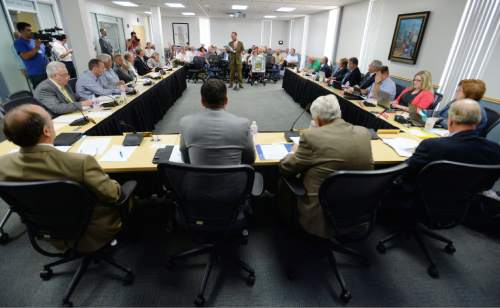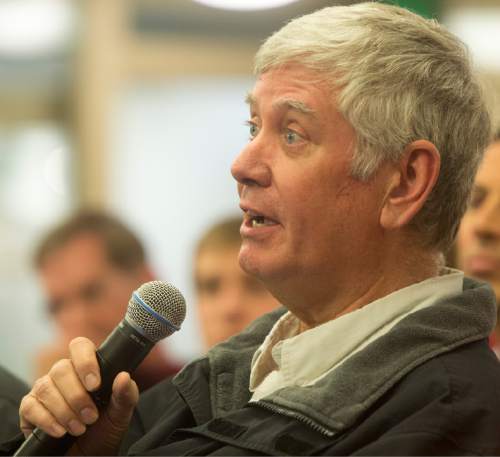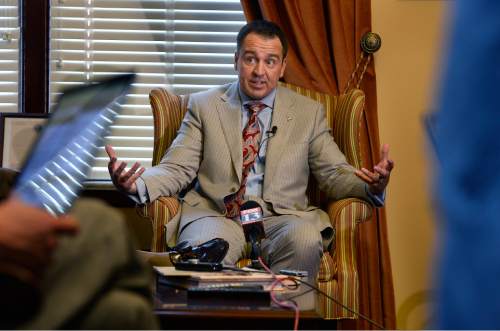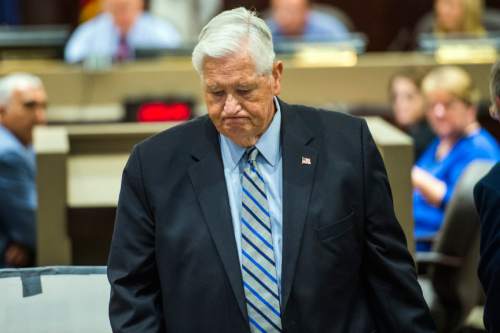This is an archived article that was published on sltrib.com in 2016, and information in the article may be outdated. It is provided only for personal research purposes and may not be reprinted.
The Utah Transit Authority, now in the midst of a campaign to improve transparency and build public trust, is moving its board committee meetings behind closed doors.
UTA recently announced reforms intended to bolster public confidence, including inviting more public comment and making all final decisions in open meetings of the full board. The announcement contained no mention of plans to close committee meetings, where UTA officials generally have worked through issues to the point that final approval by the full board usually occurs without debate.
The Salt Lake Tribune discovered the policy shift Tuesday when it asked the agency why it had not sent or posted agendas for committee meetings previously scheduled for Wednesday. UTA spokesman Remi Barron emailed the explanation that because of recent reforms to move any final decisions from committees to the full board, "the previous committee meetings will now become informal work sessions and are not required to be open meetings."
Jeff Hunt, a Salt Lake City media and First Amendment attorney, says UTA's plan would violate the Utah Open and Public Meetings Act. The Utah Transit Riders Union (UTRU), a UTA watchdog group, complains the change will exclude the public from important planning meetings.
"When you want to make the public think that you are pulling a fast one, UTA knows how to hit a home run," complained George Chapman, a board member of the UTRU, who often attends UTA committee meetings.
He also had called UTA, wondering why it had not posted agendas for Wednesday's committee meetings. He said UTA officials never returned his calls, and he learned of the policy change from The Tribune.
Christopher Stout, president of UTRU, said the transit agency's committee meetings "should remain open to the public" because they are necessary for his group and others "to understand what the agency is planning."
He commended reforms to meetings of the full board. But, he said, "Closing other meetings doesn't allow for a true transparent process. UTRU is greatly disappointed that UTA has chosen to exclude the public from planning meetings."
Before 2010, UTA conducted its committee meetings behind closed doors, contending then that Utah's open-meetings law did not require them to be open if a quorum of the full board was not present.
As The Salt Lake Tribune was contesting that reading of the law in 2010, UTA's then-new Board Chairman Greg Hughes — now speaker of the Utah House — decided to open them, although UTA asserted then that it was doing so voluntarily, not because it was required by law.
"It's going to create greater public confidence," Hughes said at the time. Since then, UTA has publicly posted agendas and minutes of the meetings, and allowed the public to attend.
Hughes, who is no longer on the board, declined to comment Tuesday.
Hunt, an expert in open-meetings law, said UTA is incorrect in its assertion that the committees are no longer public meetings because no final votes will be taken there.
"Advisory bodies are subject to the Open Meetings Act. It's right in the definition of what constitutes a public body," he said. UTA has had four committees: finance and operations, planning and development, stakeholder (to work with groups affected by UTA) and an executive committee.
If a committee "has been delegated authority to make recommendations, then it is a public body under the Public Meetings Act," Hunt said.
"The rationale is fairly straightforward," he added. "The public deserves to hear the full discussion and debate on issues of public import and not just the vote on those issues once they reach the full board."
The attorney has handled many cases in this area.
"We've dealt with this in a lot of contexts before: school boards, city councils. And the attorney general's office, in fact, in previous administrations … took the same view, that advisory bodies are subject to the Open Meetings Act. So I hope they [UTA Board members] reconsider."
The Tribune asked Barron to expound on UTA's reasoning and to spell out what work committees may be doing — but he did not provide such information.
Just last week, Board Chairman H. David Burton announced changes to UTA's full board meetings, including requiring that it (and not committees) make all final decisions. He said the full board wants "full disclosure and full transparency" and "full board review and approval" of such items. "We have embarked on a campaign to let the public know what we are doing, and what we have done in the past, to improve the trust level," Burton said at the time. "We have to have public confidence or we can't serve the public needs, Proposition 1 being a prime example of that."
Prop 1 would have raised sales taxes for transit and roads. Three counties served by UTA approved it last November: Davis, Weber and Tooele. Three defeated it — Salt Lake, Utah and Box Elder counties.









